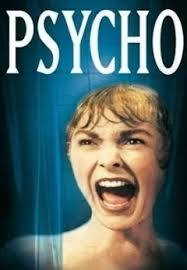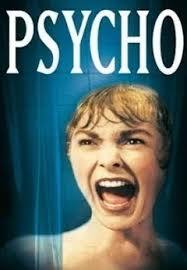- Οπτικός δίσκος βίντεο (DVD)
- Hitchcock, Alfred
- Hitchcock, Alfred
- 1998 film 9 (Remake)
- Ηνωμένες Πολιτείες Αμερικής: Imagine Entertainment, 1998
- Imagine Entertainment
- Ηνωμένες Πολιτείες Αμερικής
- 104 λεπτά : Έγχρωμη
- Πατήστε εδώ
-
- On Rotten Tomatoes, Psycho holds an approval rating of 41% based on 78 reviews, with an average rating of 5.30/10. The website's critics consensus reads: "Van Sant's pointless remake neither improves nor illuminates Hitchcock's original".[18] At Metacritic the film has a weighted average score of 47 out of 100, based on 23 critics, indicating "mixed or average reviews".[19] Audiences polled by CinemaScore gave the film an average grade of "C−" on an A+ to F scale.[20] Literary critic Camille Paglia commented that the only reason to watch it was "to see Anne Heche being assassinated" and that "it should have been a much more important work and event than it was".[21] At the 1998 Stinkers Bad Movie Awards, the film was cited as one of 37 dishonourable mentions for Worst Picture. Universal Pictures received the Founders Award "for even thinking the moviegoing public would line up and pay to see a shot-for-shot remake of Psycho". Film critic Roger Ebert, who gave the film one-and-a-half stars, noted that the addition of a masturbation scene was "appropriate, because this new Psycho evokes the real thing in an attempt to re-create remembered passion". He thought Vaughn was miscast, unable to capture the "secret pool of madness" in the character of Norman Bates, and Heche was guilty of overacting. Ebert wrote that the film "is an invaluable experiment in the theory of cinema, because it demonstrates that a shot-by-shot remake is pointless; genius apparently resides between or beneath the shots, or in chemistry that cannot be timed or counted".[22] Janet Maslin remarks that it is an "artful, good-looking remake (a modest term, but it beats plagiarism) that shrewdly revitalizes the aspects of the real Psycho (1960) that it follows most faithfully but seldom diverges seriously or successfully from one of the cinema's most brilliant blueprints"; she noted that the "absence of anything like Anthony Perkins's sensational performance with that vitally birdlike presence and sneaky way with a double-entendre ('A boy's best friend is his mother') is the new film's greatest weakness".[23] Eugene Novikov for Film Blather admired the film, saying that he enjoyed the remake more than the original film.[24] Jonathan Romney of The Guardian also championed the film, writing: "Somehow, Van Sant has managed to spin a big-budget studio project into a piece of conceptual art, a provocative inquiry into the nature of cinematic originality. It's not the full-on 'queer Psycho' that Van Sant fans predicted, but it is an extraordinary drag act".[25] Leonard Maltin's Movie Guide classified the film as a "bomb", compared to the four-out-of-four stars he gave the original. He describes it as a "slow, stilted, completely pointless scene-for-scene remake of the Hitchcock classic (with a few awkward new touches to taint its claim as an exact replica)". He ultimately calls it "an insult, rather than a tribute, to a landmark film...What promised to be 'Drugstore Cowboy's answer to Hitchcock' is more like Hitchcock's answer to Even Cowgirls Get the Blues."[26] Accolades At the 19th Golden Raspberry Awards, the film was awarded two Golden Raspberry Awards (or "Razzies"), for Worst Remake or Sequel[ii] and Worst Director for Gus Van Sant, while Anne Heche was nominated for Worst Actress, where she lost the trophy to the Spice Girls for Spice World.[27] Contrastingly, at the 25th Saturn Awards the film was nominated for the Saturn Awards of Best Supporting Actress for Heche and Best Writing for Stefano.[28] ⟶ Πατήστε εδώ
-
-
During a Friday afternoon tryst in a Phoenix hotel, real-estate secretary Marion Crane and her boyfriend Sam Loomis discuss their inability to get married because of his debts. Returning to work, she decides to steal a cash payment of $400,000 entrusted to her for deposit at the bank and drive to Sam's home in Fairvale, California. En route, she hurriedly trades her car, arousing suspicion. Running into bad weather, Marion stops for the night at the Bates Motel and uses an alias. Proprietor Norman Bates invites her to dine with him. After he returns to his house atop a hill overlooking the hotel, Marion overhears him arguing with his mother Norma about her presence. Norman returns and apologizes for his mother's outbursts. He discusses his taxidermy hobby, his mother's "illness" and how people have their own "private trap" that they wish to escape from. Marion, remorseful of her crime, decides to return the stolen money, unaware that the aroused Norman is watching her through a hole in the wall. As she showers, a shadowy figure brutally stabs her to death. Horrified upon finding Marion's corpse, Norman places her body and the hidden cash in her car, and sinks the car in a swamp nearby. Marion's sister Lila arrives a week later and tells Sam about the theft. Private investigator Milton Arbogast says that he has been hired to retrieve the money. He questions Norman and finds him suspicious; when he asks to speak to Norman's mother, Norman refuses. Arbogast enters the Bates home, where a figure resembling an elderly woman fatally stabs him. Hearing no word from Arbogast, Sam and Lila grow curious about the Bates Motel, Arbogast's last stop. Al Chambers, the local sheriff, tells them that Norman's mother died in a murder-suicide ten years earlier. Convinced that something happened to Arbogast, Lila and Sam check into the Bates Motel posing as a married couple, and infiltrate Marion's room, finding a missing shower curtain and a paper indicating that Marion subtracted an amount from her cash payment. Sam distracts Norman in the office, while Lila sneaks into his house. Norman becomes agitated and knocks Sam unconscious. Lila hides in the fruit cellar, where she discovers the mother's mummified body. She screams, and Norman, wearing his mother's clothes and a wig, tries to stab her. Sam subdues him, rescuing Lila. At the police station, psychiatrist Dr. Simon Richmond explains that Norman jealously murdered Norma and her lover by poisoning them with strychnine ten years earlier. He mummified her corpse and began treating it as if she were still alive, going so far as to recreate her in his mind as an alternate personality, as jealous and possessive as she was while alive. When Norman is attracted to a woman, "Mother" takes over: he had murdered two other women before Marion, and Arbogast was killed to hide "his mother's" crime. "Mother" has now completely taken over Norman's personality. Sitting in a jail cell, Norman hears his mother saying that the murders were all his doing, as Marion's car is retrieved from the swamp.
⟶ Πατήστε εδώ
-



